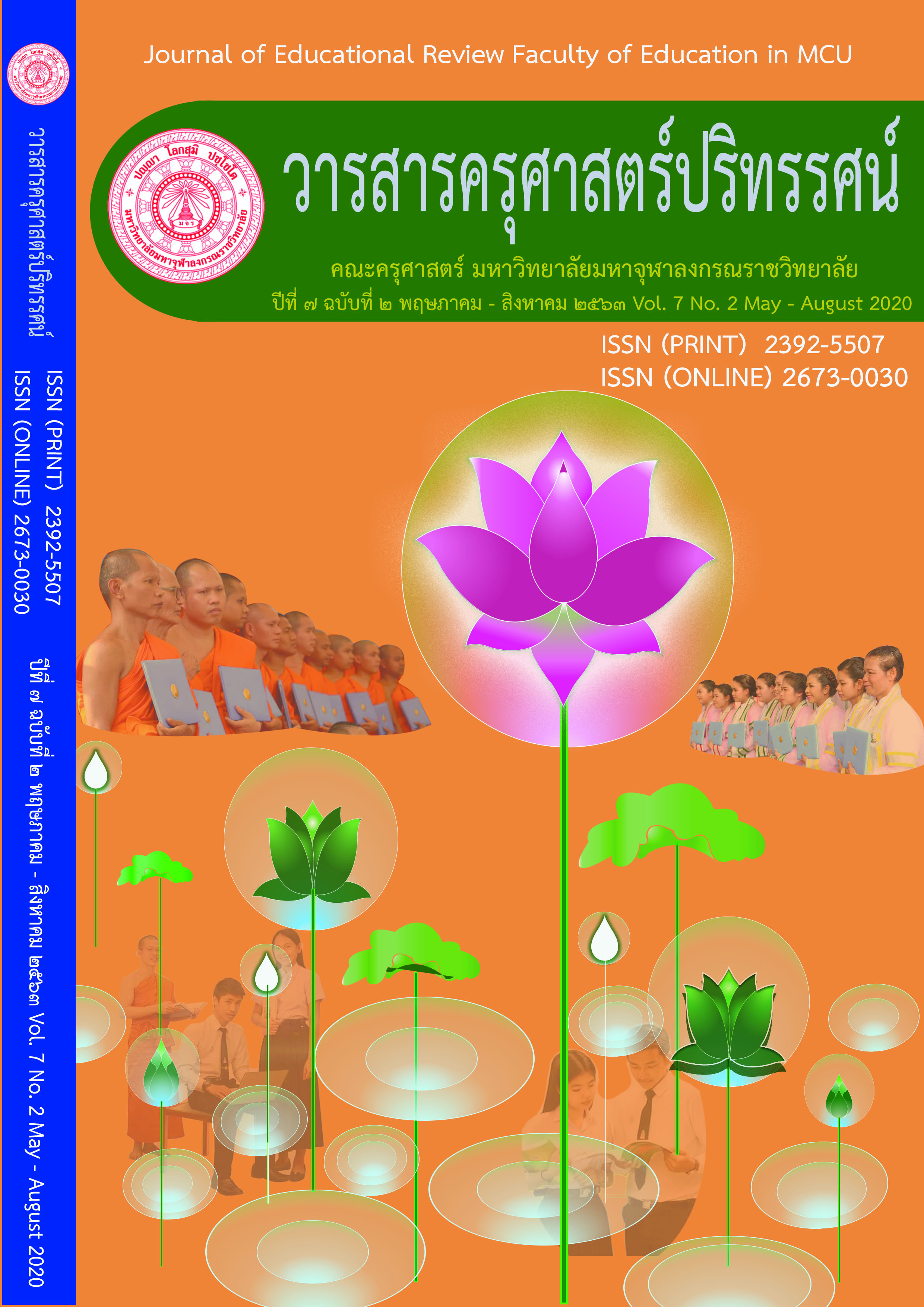TEACHERS' VIEWS ON ETHICAL BEHAVIOR OF ADMINISTRATORS IN WITTAYAPRAKARN SCHOOL CLUSTER UNDER THE SECONDARY EDUCATIONAL SERVICE AREA OFFICE 6
Main Article Content
Abstract
The purpose of this research were 1) to study teachers' views on the ethical behavior of school administrators of Secondary Educational Service Area Office 6 under the Wittayaprakarn School Cluster and 2) to compare views on the ethical behavior of school administrators of Secondary Educational Service Area Office 6 under the Wittayaprakarn School Cluster. This study was a survey research and the questionnaires were used as a group of 235 teachers under the Wittayaprakarn School Cluster. Data were analyzed using descriptive statistics such as frequency, percentage, mean, standard deviation, t-test and one-way analysis of variance. The results of the study revealed as follow. Firstly, the ethical behavior of the executives in general in 7 aspects according to ethical standards is at a high level. Which is arranged in descending order as follows: 1) to cherish the main institutions of the country which are nation, religion, monarchy and democracy with the monarchy as head of state, 7) to be a good role model and maintaining the image of the government, 6) to perform their duties fairly with no discrimination, 4) to think about the general benefits more than the personal benefits and to have a public mind, 3) to decide to do and do what is right, 2) to honestly have a good conscience and be responsible for duty, and 5) to focus on job achievement, respectively. Secondly, the comparison of views on the ethical behavior of school administrators of Secondary Educational Service Area Office 6 under the Wittayaprakarn School Cluster by gender, age, educational level and work experience was found to be not significantly different at .05 level in all aspects.
Article Details
ทัศนะและความคิดเห็นที่ปรากฏในบทความในวารสารฉบับนี้ถือเป็นความรับผิดชอบของผู้เขียนบทความนั้นเพียงผู้เดียว และไม่ถือเป็นทัศนะและความรับผิดชอบของกองบรรณาธิการ
กองบรรณาธิการขอสงวนสิทธิ์ในการคัดเลือกบทความลงตีพิมพ์และจะแจ้งให้เจ้าของบทความทราบหลังจากผู้ประเมินบทความตรวจอ่านบทความแล้ว
ต้นฉบับที่ได้รับการตีพิมพ์ในวารสารครุศาสตร์ปริทรรศน์ คณะครุศาสตร์ มหาวิทยาลัยมหาจุฬาลงกรณราชวิทยาลัย ถือเป็นกรรมสิทธิ์ของคณะครุศาสตร์ มหาวิทยาลัยมหาจุฬาลงกรณราชวิทยาลัย ห้ามนำข้อความทั้งหมดหรือบางส่วนไปพิมพ์ซ้ำ เว้นเสียแต่ว่าจะได้รับอนุญาตจากมหาวิทยาลัยฯ เป็นลายลักษณ์อักษร
References
กนกวรรณ บุญเรือง. (2560). ภาวะผู้นำเชิงจริยธรรมของผู้บริหารสถานศึกษา เขตพื้นที่การศึกษาประถมศึกษาลำปาง เขต 3. ฉบับภาษาไทย สาขามนุษยศาสตร์สังคมศาสตร์และศิลปะ. 10(3). 1409-1426.
กระทรวงการพัฒนาสังคมและความมั่นคงของมนุษย์. (2560). ยุทธศาสตร์ชาติว่าด้วยการป้องกันปราบปรามการทุจริต ระยะที่ 3 (พ.ศ. 2560 - 2564). แหล่งที่มา www.anticorruption.m-society.go.th/?page_id=1315. สืบค้นเมื่อ 3 พ.ย. 2562.
กลุ่มนิเทศ ติดตาม และประเมินผลการจัดการศึกษา สพป. นครปฐม เขต 2. (2562). โครงการเสริมสร้างคุณธรรมในสถานศึกษา. แหล่งที่มา https://sites.google.com. สืบค้นเมื่อ 3 พ.ย. 2562.
ชัยเสฏฐ์ พรหมศรี. (2551). คู่มือสู่องค์การแห่งความสำเร็จ. กรุงเทพมหานคร: ปัญญาชน.
ชูศรี วงศ์รัตนะ. (2550). เทคนิคการใช้สถิติเพื่อการวิจัย. พิมพ์ครั้งที่ 10. นนทบุรี: ไทยเนรมิตกิจอินเตอร์โปรเกรสซิฟ.
ดวงฤดี ศิริพันธุ์. (2560). ภาวะผู้นำเชิงจริยธรรมของผู้บริหารสถานศึกษาตามความคิดเห็นของครูโรงเรียนการกุศลของวัดในพระพุทธศาสนา สังกัดสำนักงานการศึกษาเอกชน จังหวัดสงขลา. การประชุมหาดใหญ่วิชาการระดับชาติและนานาชาติ ครั้งที่ 9. 9(1). 1161-1173.
ธีรพงษ์ จินพละ. (2557). พฤติกรรมคุณธรรมจริยธรรมของผู้บริหารสถานศึกษาในโรงเรียนสังกัดสำนักงานเขตพื้นที่การศึกษาประถมศึกษาบุรีรัมย์ เขต 1. วิทยานิพนธ์ครุศาสตรมหาบัณฑิต. มหาวิทยาลัยราชภัฏบุรีรัมย์.
พรเทพ จันทรนิภ. (2557). รูปแบบจริยธรรมในการบริหารวิสาหกิจยุคใหม่. วารสารเกษมบัณฑิต. 15(2). 60-74.
พรพิพัฒน์ เพิ่มผล. (2556). คุณลักษณะผู้นำของผู้บริหารตามทัศนะของบุคลากรมหาวิทยาลัยกรุงเทพธนบุรี. บัณฑิตวิทยาลัย มหาวิทยาลัยราชภัฏสวนดุสิต. 10(1). 357-365.
พระครูสังฆรักษ์ บุญใส รตนปุตฺโต (สามา). (2558). คุณธรรมของผู้นำทางการศึกษา. วารสารครุศาสตร์ปริทรรศน์ คณะครุศาสตร์ มหาวิทยาลัยมหาจุฬาลงกรณราชวิทยาลัย. 2(1). 57-69.
ราชกิจจานุเบกษา. 2542. พระราชบัญญัติการศึกษาแห่งชาติพ.ศ. 2542 แก้ไขเพิ่มเติม (ฉบับที่ 2) พ.ศ. 2545 และ (ฉบับที่ 3) พ.ศ. 2553. แหล่งที่มา https://person.mwit.ac.th/01-Statutes/ NationalEducation.pdf สืบค้นเมื่อ 2 พ.ย. 2562.
ราชกิจจานุเบกษา. (2562). ตามพระราชบัญญัติ มาตรฐานทางจริยธรรม พ.ศ. 2562. แหล่งที่มา http://www.ratchakitcha.soc.go.th/DATA/PDF/2562/A/050/T_0001.PDF สืบค้นเมื่อ 2 พ.ย. 2562.
วิกิคำคม. (2562). พระบรมราโชวาทพระบาทสมเด็จพระเจ้าอยู่หัว. แหล่งที่มา https://th.wikiquote.org/wiki สืบค้นเมื่อ 3 พ.ย. 2562.
สำนักนายกรัฐมนตรี. (2560). แผนพัฒนาเศรษฐกิจและสังคม แห่งชาติ ฉบับที่สิบสอง พ.ศ.2560 - 2564. แหล่งที่มา www.royalthaipolice.go.th/downloads/plan12.pdf สืบค้นเมื่อ 3 พ.ย. 2562.
สุชาดา นันทะไชย. (2554). จริยธรรมวิชาชีพสำหรับผู้บริหารทางการศึกษา. กรุงเทพมหานคร: โรงพิมพ์สามเจริญพาณิชย์ (กรุงเทพ).
Derrick Meador. (2017). The Role of the Principal in Schoolsl. From http://www.wallacefoundation.org/knowledgecenter/pages/keyresponsibilities-the-school-principal-as-leader.aspxDateretrieved Retrieved November 17, 2017
Narayan Biswal B. (2016). Ethical Issues in School Educational Management. Issues and Ideas in Education. 4(1). 29-36.
Yamane, T. (1973). Statistic: An Introductory Analysis. 3rd ed. New York: Harper and Row.


